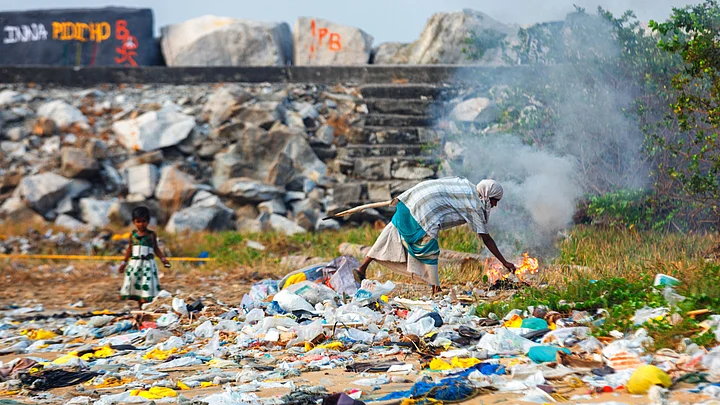Plastic pollution, until recently, commanded low priority in Indian policy and academic discourse. Lately, however, greater attention is being drawn to plastics, due to the global focus on climate change and the appreciation of the disastrous impact of plastics on river and ocean systems, and human and animal life. The Indian government's robust anti-plastic campaign, policy enforcement, enhanced waste management, and innovative approaches illustrate a steadfast commitment to combating plastic pollution and fostering a sustainable future.
Despite these, concrete results have remained elusive, due to weak implementation capacities at various levels and lack of general awareness and recognition of plastics as a huge threat to the environment and health. India’s population growth and development trajectory has meant that the efforts to mitigate the plastic problem have not been commensurate with the challenges that it presents.
Plastic Pollution and Climate Change
According to the Central Pollution Control Board, India generates around 9.4 million tonnes of plastic waste every year. Most of this plastic waste ends up in landfills or the ocean, contributing to emissions and marine litter, in addition to clogging drains in urban areas – causing floods, which further exacerbates the problem. The staggering figures, coupled with inadequate waste management systems, places India at the forefront of negative environmental change due to plastics.
Plastic pollution is closely linked to accelerating climate change, as plastic waste on land releases methane and other harmful greenhouse gases, while plastic in oceans interferes with their capacity to absorb carbon dioxide.
According to a 2018 study by the Centre for Science and Environment, India's landfills emit about 12.5 million tonnes of carbon dioxide equivalent annually, corresponding to total emissions from about 3.5 million cars. India's fragile ecosystems are under siege; plastic pollution's pervasive reach across India's rivers, coasts, and land poses a grave menace to the nation's environment, demanding urgent action and collective responsibility.
Plastics present a global problem to ecosystems worldwide and this calls for a stronger collaboration between governments, industries, and individuals to create a sustainable future, free of plastic pollution, at the global as well as national levels. This is being emphasized and is high on the agenda at the second session of the Intergovernmental Negotiating Committee on Plastic Pollution, being held in Paris, France from 29 May to 2 June 2023. India is increasingly aligning itself with ambitious climate goals and global agendas, highlighting the commitment of the government to combat climate change.
In its recent submission of the updated Nationally Determined Contribution to the UNFCC, India committed to reducing the Emissions Intensity of its GDP by 45 percent by 2030. This, when seen in conjunction with India’s long-term goal of net zero by 2070, requires concrete efforts and resource channelling at all levels. The reduction and management of plastic waste, by investing in better waste management systems and promoting a circular economy can help mitigate climate change and support India’s climate commitments.
What Could India Do?
India needs to adopt a two-pronged approach to mitigating plastic pollution. An efficient and comprehensive waste management system, targeting the whole value chain is the first step towards it. India needs to direct more resources toward waste management and push policymakers and administrators to institute and implement evidence-based and context-specific policies and solutions.
There is a need to enhance source segregation at household levels and strengthen waste collection and disposal systems, in line with RRR (Reduce, Reuse, Recycle) approach to reduce the amount of plastic waste being dumped in landfills and oceans. Further, more concrete effort needs to be directed at problem plastics (Single-use plastics/SUPs), by promoting innovation to support the transition towards plastic alternatives.
The second, simultaneous step is promoting and adopting circular economy approaches by promoting the use of eco-friendly products, recycling, and repurposing plastic waste, and strengthening the implementation of an extended producer responsibility (EPR) framework.
According to a report by the Ellen MacArthur Foundation, a circular economy approach could reduce global plastic waste by 80 percent by 2040. For India, the concept has the potential to transform unsustainable modes of plastic production and consumption, striking a sustainable balance between India’s growing economy, threatened environment, and interconnected society.
This two-pronged approach has to be implemented through increased investment in waste infrastructure, technological innovation, awareness programs, and an efficient regulatory and policy eco-system, which drives plastic waste reduction, management, and alternative promotion.
The growing threat of plastic pollution, therefore, can indeed drive India’s transition towards a circular economy, generating value for the overall economy and supporting India’s achievement of its climate goals. Thus, in spite of being a major challenge, managing plastic pollution also presents a huge opportunity for India.
(Anil Bansal is Senior Director, Urban Infrastructure and Tourism, at IPE Global. Mohsin Ganai is Manager, Urban Infrastructure and Tourism, at IPE Global. The views expressed above are the author's own. The Quint neither endorses nor is responsible for them.)
